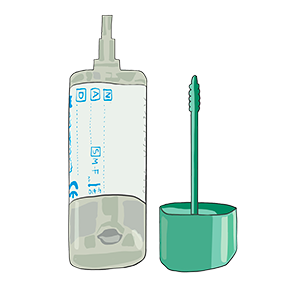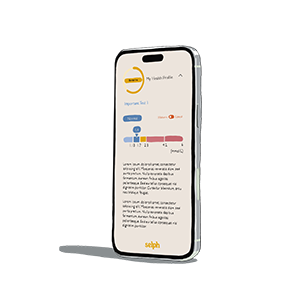Personalise your qFIT test
Subscribe & save
PopularBest practice is to check for bowel cancer every year from your 40s. Subscribe to a yearly qFIT test and save 15%.
Add to your test
3 add-ons availableTotal price:
£57.00
Includes our
qFIT Bowel Cancer Screening Test
The qFIT test - used in the NHS and the Bowel Cancer Screening Programme - is a FIT stool test that picks up blood in the stool which can be caused by bowel cancer. So if you've got gut symptoms or just want to screen for bowel cancer, this is the test for you.
Use our easy at home bowel cancer test kit to send a stool sample to our NHS-testing lab and you'll get your FIT test result and doctor's report with recommendations in a day.
What you need to know about our qFIT Bowel Cancer Screening Test
If you're looking for the stool test to check your bowel cancer risk then the qFIT Bowel Cancer Test is what you need. The qFIT test checks for blood in the stool which can be an early sign of bowel cancer.
The qFIT test is the same FIT stool test used by the NHS - except we're much faster and you get your actual FIT level along with your doctor's report.
When should I start testing for bowel cancer?
Bowel cancer is common and will affect around 1-in-15 of us. Rates of bowel cancer are going up people under 50 so we recommend starting to screen for bowel cancer with a qFIT test every year from your 40s. This is the best practice followed in other countries like the USA.
What are the main symptoms of bowel cancer?
The main symptoms of bowel cancer include:
- A change in bowel habits
- Blood in the stool
- Stomach pain or lumps
- Weight loss
- Unexplained fatigue or tiredness
In the early stages, many people with bowel cancer have no symptoms but we can still pick up bowel cancer early with a FIT stool test by testing for tiny amounts of blood in your stool (that you wouldn’t be able to see) with a “quantitative faecal immunochemical test” or qFIT. The sooner you detect bowel cancer, the better your chances of beating it.
What do the FIT test results mean?
Your bowel cancer FIT result will include your actual FIT level and a report from one of our doctors explaining what your level means. You'll also be able to download your formal lab report so you can easily share it with your doctor.
A negative FIT test result means that no blood was detected in your stool and it's very unlikely that you have bowel cancer.
A positive FIT test result means that blood was detected in your stool and you'll get a number with the amount of blood in the stool, measured in micrograms per gram of stool (µg/g). This is usually between 4 and 200µg/g. The higher the number, the more likely it is that bowel cancer is the cause.
| FIT level (µg/g) | Risk of having bowel cancer (approx.) |
| Less than 4 (“negative”) | 1 in 1000 |
| 4 - 9.9 | 1 in 160 |
| 10 - 99.9 | 1 in 30 |
| 100 or higher | 1 in 5 |
Limitations of the bowel cancer FIT test
Although qFIT tests are one of the best tests we have to pick up bowel cancer early, they're not perfect:
- Around 1 in 1000 people can have a negative qFIT test but later be found to have bowel cancer.
- Most people with a positive qFIT test do not have bowel cancer. Remember, a qFIT test doesn't diagnose bowel cancer, it just looks for the presence of blood in the stool.
- If a qFIT test picks up blood in your stool, you may need a camera test to look inside the bowel to know what's caused it.
How the qFIT test works
In the box


Do your test
You'll get your kit next-working day.
Collect your qFIT sample at home and send it back to our UKAS-accredited lab for analysis.

Get rapid results
Once the lab have your sample, you'll get your results same-day (over 90% of tests).
Your result includes the qFIT level and a doctor's report to help you understand what it means.

Get support
We have the best customer support team in the world.
We get that doing a qFIT test can be a bit daunting - our doctors and admin team are always just a phone-call away if you need any help.
Find out more about the qFIT test for bowel cancer
It's best not to take this test while you're on your period. You don't need to make any changes to your diet or any medications and supplements that you may take.
This simple stool test checks for tiny amounts of blood in the stool which you wouldn't be able to see. Blood in the stool can be a sign of a bowel polyp or cancer. If you have a positive result then we would usually recommend that you have a further test, such as a bowel camera test or colonoscopy, to have a look inside the bowel. If you have a negative test then it's very unlikely that you have bowel cancer.
When you take a FIT stool test with us, we'll give you the actual numeric value returned by the lab. We consider any amount of blood detected by a FIT to be a positive test. This is because studies show that, if you have bowel symptoms, even a very low FIT level of 4-9µg/g can be caused by bowel cancer. Different qFIT thresholds are considered "positive" in the NHS. If you have gut symptoms and take a qFIT test with your GP, they would generally only consider a result of 10µg/g to be positive. If you take a qFIT test as part of the Bowel Cancer Screening Programme, they only consider a result of 120µg/g to be positive.
Firstly, it's important to stress that most people with a positive FIT result (even if the level is high) do not have bowel cancer. They have another cause for the blood, such as haemorrhoids (piles). If you have a positive FIT result, we will advise you to see your GP. They will go through your symptoms and medical history. They will discuss with you whether further tests, such as a colonoscopy to look inside the bowel, are necessary.
Our qFIT tests are analysed by The Doctors Laboratory (TDL). TDL are one of the largest laboratories in the UK and test for both the NHS (e.g. University College Hospital London) and private providers such as ourselves. Either way, the exact same testing platforms and procedures are used.
However, no test is perfect and there can always be "false positive" and "false negative" results.
Using a "positive" cut-off of 4µg/g (the limit of detection for the test), the sensitivity of qFIT to pick up bowel cancer is over 93.4% with a specificity of 77%. The "negative predictive value" (the likelihood that you don't have bowel cancer if you get a negative qFIT result) is approximately 99.9%ref.
We do not recommend using this test panel if you:
- are a child (17 years or under). Bowel cancer is essentially unheard of at this age and if you're concerned, it would be better to discuss this with your GP.
- are pregnant. If you feel you need to take a qFIT test and are pregnant, please discuss this with us.
- are feeling acutely unwell - e.g. with a cold or flu or if you have new-onset (i.e. within the last few days) gut symptoms like stomach pain or diarrhoea.
If you're unsure if you should use this test panel, please contact us for advice.
Still have questions?
If you have any questions, we're here to help. Our customer service team is hands-down the best you'll ever deal with. They're smart, friendly, knowledgeable and will get back to you in a flash.
We've got the stats to back it all up.
When it comes to health, you want to know you’re in safe hands. We’ve got decades of experience, and we’ve got the stats to prove it.
20+
Years in healthcare
65,000+
5 star reviews

1 million+
Happy customers
2 million+

Our Privacy Promise
Your health is yours. It's personal. That's why we're committed to keeping your data safe and secure. Here's how we do it:
See our Privacy Policy and our Terms of Service for more info.






